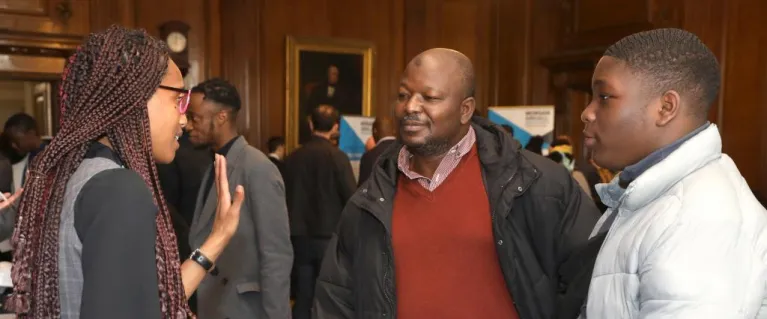
Workforce Integration Network (WIN)
Explore the Mayor's Inclusive Employer Toolkits, designed to improve equality, diversity and inclusion in your organisation.
Browse toolkitsLondon's labour market inequalities
Londoners from Black, Asian and Minority Ethnic backgrounds face disproportionate barriers in the labour market. The employment gaps between different minority ethnic groups and their white counterparts suggest ongoing inequalities in the labour market.
Research shows that there are significant differences in how Londoners are able to access high-quality work, wages, and workplace rights. To ensure that London is a fair city for all that live here, we must address the barriers Londoners face in the workplace.
What the Mayor is doing
In 2018, as part of his Strategy for Social Integration, the Mayor launched the Workforce Integration Network (WIN).
WIN works with employers, industry bodies and other public authorities to improve pathways for under-represented groups in the workplace to access and progress in good work and sustainable careers.
Our focus
The network is focused on improving labour market inequalities for groups identified as among the most underrepresented in London’s workforce, specifically:
- young Black men (16–24) and older Black men (50+)
- Black women
- Pakistani and Bangladeshi women
These groups experience unemployment at considerably higher rates in comparison with white Londoners and are significantly more likely to be in low-paid and insecure work, including pay well below the London Living Wage.
Within these groups, WIN has a particular focus on disabled people and workers in lower socio-economic groups, as an intersectional approach shows that these factors are likely to compound labour market inequalities and exclusion.
What we do
WIN provides support to employers in key industries which have been identified as key growth sectors in London’s economy and priorities for the Mayor, including:
- health
- social care
- creative industries
- green economy
- digital
- hospitality.
By providing a range of interventions and tools, WIN supports employers to address labour market inequalities. This includes:
- supporting and convening employers, through its bespoke and tailored Design Labs programme, to analyse the challenges in each respective industry with their peers and develop and test co-designed, and innovative interventions to tackling underrepresentation and inequalities within these industries
- producing resources, such as the Inclusive Employer Toolkits, to assist employers in key sectors of London’s economy to improve equality and inclusion in their organisation
- commissioning and publishing research to improve understanding of the barriers to accessing good work for particular groups, building the evidence base of which types of interventions are most effective at tackling labour market inequalities
- working collaboratively with key partners to improve pathways into work for underrepresented groups, such as young Black men.
How employers can help
Underrepresentation in the workplace is caused by a range of factors including discrimination, skills mismatch, and lack of qualifications and networks. For this to change, employers must be more aware of the problem and what they can do to address it.
WIN works with employers to address the challenges of improving representation in the workplace. All you need is a commitment to engage with the programme.
Programmes and resources
WIN has published a range of programmes and resources designed to help employers to identify their next steps to make their organisation more equal and inclusive of underrepresented groups.
WIN’s Inclusive Employer Toolkits are designed to help employers from five key industries to make meaningful progress towards equal and inclusive workplaces for all Londoners.
The industry-specific toolkits are available for organisations in hospitality, healthcare, the creative industries and the green economy, with a toolkit for the technology industry forthcoming.
Collecting and analysing data on your workforce is an essential prerequisite to making progress on equality, diversity and inclusion. You need to know your workforce and know where you are starting, so that you can know whether and where you have made progress as you start to implement your action plan.
WIN has published the Workforce Equality Data Guide, which explains how to gather data, what data to collect and what to do with it.
The Workforce Integration Design Lab is a 10-month Equity, Diversity and Inclusion (EDI) programme supporting large businesses to tackle the underrepresentation of Black, Asian, and Minority Ethnic (BAME) groups in London’s labour market.
Research and data
WIN commissions and publishes research to better understand the barriers to entry and progression for particular underrepresented groups in London’s workplaces.
WIN commissions and publishes research to better understand the barriers to entry and progression for particular underrepresented groups in London’s workplaces.
'Voices of the Underrepresented' produced by the Runnymede Trust, investigates the barriers facing young Black men in accessing good work. It uniquely centres the voices of young Black men throughout and focuses on their experiences in the technology and construction industries to highlight sector-specific barriers. It draws out key connections between their experiences and the role of employers in increasing the representation and inclusion of young Black men.
'Bangladeshi and Pakistani Women in good work' explores the systemic barriers Bangladeshi and Pakistani women face in accessing ‘good work’ in London, drawing on community-led research conducted by the National Institute for Economic and Social Research (NIESR). The summary report highlights structural inequalities, including discrimination, limited flexible working and exclusionary workplace cultures, and calls on employers and policymakers to create inclusive pathways to secure and fair work.
Supporting workforce diversity isn’t just the right thing to do - it’s essential for London’s economic growth. The Mayor is committed to helping underrepresented Londoners into good jobs and making a strong moral and business case for inclusive workplaces across the capital.
‘Bridging the Gap: The Economic Case for Workforce Diversity in London’, draws on analysis from GLA Economics to show that helping more people from ethnic minority backgrounds enter the workplace and progress within good jobs could unlock £17.4 billion in economic benefits for London. It highlights the impact of intersectional factors like gender and disability and suggests ways that policymakers and employers can create and benefit from more inclusive, accessible workplaces for all Londoners.